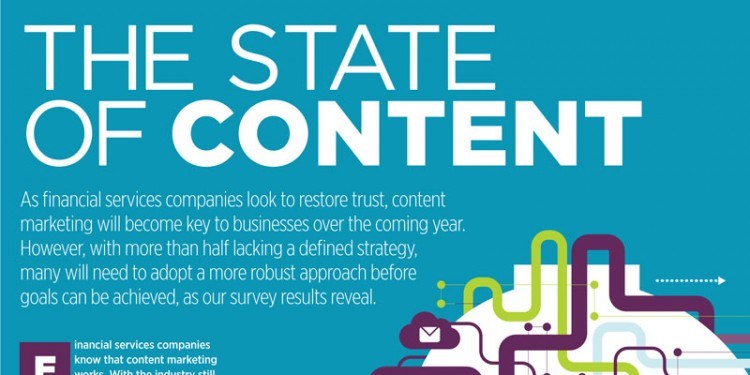As financial service companies work to rebuild trust, most believe that content marketing will become increasingly important to their businesses in the coming year. But with more than half lacking a defined content management strategy, many will need to adopt a more robust and consistent approach before they can achieve their goals.
To see the full articles and diagrams, please download the PDF version.
Financial service companies know that content marketing works. With the industry still striving to improve its image, engaging content can be used effectively to build brand awareness, strengthen loyalty and bolster customer relationships. But simply producing content is not enough. To achieve their goals, companies need to create engaging content, navigate the plethora of formats and distribution channels available – and engage with customers at the deepest level. With less than 2% of financial services companies deeming their own content marketing efforts highly effective, there is plenty of room for improvement in this area – and for many such companies, the greatest stumbling block is the lack of a defined content marketing strategy.
THE RISE OF CONTENT MARKETING
In September, The Financial Services Forum worked with Editions Financial and dianomi to produce the Content Marketing for Financial Services survey. We gauged the views of financial services brands and marketers and found that over 95% use content to market their products and services – with almost 90% expecting content marketing to become more important for their organisations in the coming 12 months.
Financial services companies are certainly looking closely at the opportunities that content marketing can bring – and with good reasons. In 2014, the Edelman Trust Barometer once again found financial services to be the least trusted industry globally.
More than three quarters of our survey’s respondents believe that content marketing is more effective than other approaches when it comes to rebuilding trust in financial services. No wonder, then, that financial services companies see content marketing as increasingly important to their businesses.
While trust and reputation are key content marketing goals, only 13% of respondents said they are specifically focusing on sales. Rather, financial services companies are taking a more wide ranging approach: the most common objectives are brand awareness and thought leadership, both cited by 71% of those polled. Customer retention/loyalty was a close third, cited by 69%.
OVERCOMING THE OBSTACLES
Financial services companies are investing in content marketing and they know what they want to achieve – but realising those goals is another matter. When asked how effective their organisations are in the use of content marketing, only 1.6% gave themselves the highest score. The majority – 60% – rated themselves three out of five, while almost 7% said their use of content marketing was not at all effective.
So what is preventing companies from achieving their goals? Numerous factors can impede effective content marketing – but for most financial services companies, budget is not one of them. Lack of budget was only cited as a challenge by 18% of respondents – and 53% said they expect their content marketing budget to increase in the next year.
Financial services companies may be focusing attention and resources on content marketing, but they are also concerned about the effectiveness of their efforts. Over 56% of respondents said a major challenge is producing content that is sufficiently engaging, while lack of a measurable ROI is a concern for half. Simply producing enough content was also a concern for more than a third of respondents.
Another common stumbling block is the lack of a co-ordinated strategy. Less than half of those polled have a defined content marketing strategy, and 48% said the lack of a strategy is one of their biggest challenges in this area.
All too often companies have a number of teams producing content, including marketing, PR, events, social media and digital, but do not have a clear strategy in place. As a result, different types of material may repeat, overlap – or worse still, contradict each other. Mixed messages defeat the objectives of content marketing, while replicating efforts across the organisation is inefficient at best; counterproductive at worst.
Fortunately, financial services brands are realising that without a content marketing strategy, it may be difficult to achieve their goals efficiently and effectively. The survey also found that over half of respondents are planning to implement a defined content marketing strategy – leaving only 6% with no plans to put a strategy in place.
SPREADING THE WORDS
Content marketing is not simply about generating words – it’s also about getting content to the right people in the right way. Distribution of content is another area where companies can often find opportunities for improvement.
The survey found that email was the favoured distribution channel, with 24% reporting that email distribution generates the most traffic – followed by social media (15%) and influencers (13%). Sites and blogs were only seen as an effective distribution channel by 2%.
Distributing content can be a challenging prospect with so many different formats and distribution channels to navigate. The survey suggests that many financial services companies are not making the most of their content. The majority (53%) are using between one and four different channels to activate their content, while 44% use between five and nine. Only 3% use more than 10 channels.
Best practice in content marketing is to ‘create once, publish everywhere’ – in other words, to distribute material as widely as possible. This is one method that companies can use to increase ROI on their content marketing efforts – which was a concern for half of the survey’s respondents.
RISING TO THE CHALLENGE
Financial services companies understand the opportunities of content marketing. They are also aware that a defined strategy is key to achieving their brand awareness, loyalty and customer retention goals. As more companies adopt a more strategic approach, they will be in a stronger position to develop a clear content proposition, build deeper engagement with their audience – and achieve greater return on their content marketing investments.

